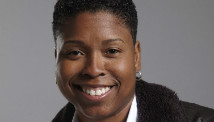Vernice Armour says "bottom line is if you can do the job, you should be out there doing it...man or a woman. "
STORY HIGHLIGHTS
- Vernice Armour: In 2004 battle in Iraq, she saved a Marine squad by shooting a missile
- She says rescued Marines didn't care she was a woman. Now Pentagon lifting ban
- She says women in combat roles doesn't lower standards; they have long served in military
- Armour: Having more women on battlefield will up military's ability to carry out mission
Editor's note: Captain Vernice "FlyGirl" Armour is America's first African-American female combat pilot, having flown AH-1W Super Cobra Attack Helicopters for two tours of duty with the Marines in Iraq. She is author of the book "Zero to Breakthrough: The 7-step, Battle-Tested Method for Accomplishing Goals That Matter." She is a business coach and keynote speaker for corporations and organizations.
(CNN) -- I was sitting in the cockpit of my AH-1W Super Cobra attack helicopter when my division got a desperate call for help. It was August 2004, and I was a part of the 11th Marine Expeditionary Unit based in Iraq.
Insurgents were hitting our troops with mortar rounds. The Marine squad was out of ammunition and couldn't shoot back. They had just fought a long and fierce battle, supply reinforcements couldn't reach them and they didn't even have any green smoke to mark their position for us. They needed assistance immediately.
We took out the enemy target with the last remaining missile on our aircraft. Several months later, I was talking to a Marine. When he found out I flew Cobras, he started to recount an experience he had in Iraq in which a Cobra shot a missile and saved his squad. Turned out, it was the same mission; the missile came from my aircraft. He stared at me and said, "Ma'am, you saved my life." Did it matter that the one who fired that missile was a woman, or that she was black and gay? Absolutely not!

Vernice Armour
Fast forward almost 10 years to 2013, and history has been made for women in the military. The ban on women in military combat has been lifted, allowing women to apply for jobs in front-line positions and elite commando units.
According to statistics from Women In Military Service For America Memorial Foundation, as of September 2011, there were 214,098 women serving on active duty in the military. While that might sound like a large number, these women make up only 14.6% of all active-duty service personnel. In the Marine Corps, women make up just a little more than 6%. The Pentagon says women have been barred from roughly 237,000 positions, and they will now start looking to qualified women to fill these roles. This is long overdue.
The debate the move has raised presents an obvious reality check: Our American community needs to be educated that women are capable of taking on military roles and have done so throughout the nation's history.
Women have already proven we can handle ourselves on the front lines. And in recent times, even with the ban on women in combat in place, women have been POWs. The Lioness Program, the Marine Corps all-female search team, is an example of why we can't accomplish our front line missions without women. The reality of modern warfare is that there are no front lines.
Honestly, I am offended by how many times I hear "women in combat" and "lowering standards" used in the same sentence. True, the average man is physically stronger than the average woman. Standards should not be lowered and women don't want them to be. No one should be in a job where he or she doesn't meet the standards -- not every man, for example is fit to be a Navy SEAL.
The argument that women in combat will have a negative impact on unit cohesion and morale is the same argument that was used to keep blacks and gays out of the military. At what point do we bring a stop to these ridiculous arguments and address what really matters?
Having more women on the battlefield will improve the military's ability to carry out its mission. During my two tours flying helicopters in Iraq, my unit experienced many dangerous and potentially life-threatening scenarios. The ultimate sacrifice wasn't meted out by gender.
For those who are against women serving on the front line, know this: Opening up combat roles for women is merely formalizing the reality of what was already happening; it's just opening more roles and opportunities. The bottom line is if you can do the job, you should be out there doing it, whether you're a man or a woman.
The military has been a personal journey for me. My grandfather served in World War II and was a Montford Point Marine. My stepdad was a Marine and served three tours in Vietnam, and my father retired as a major from the Army Reserves after 24 years. I love being part of this legacy, and the legacy of service to our great nation. It's time we give women the same opportunity to serve this great country. We're all in this together.
Follow us on Twitter @CNNOpinion.
Join us on Facebook/CNNOpinion.
The opinions expressed in this commentary are solely those of Vernice Armour.
Why women belong on war front-lines
This article
Why women belong on war front-lines
can be opened in url
http://artofspadez.blogspot.com/2013/01/why-women-belong-on-war-front-lines.html
Why women belong on war front-lines
